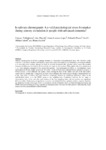Mostrar o rexistro simple do ítem
Is salivary chromogranin A a valid psychological stress biomarker during sensory stimulation in people with advanced dementia?
| dc.contributor.author | Valdiglesias, Vanessa | |
| dc.contributor.author | Maseda, Ana | |
| dc.contributor.author | Lorenzo-López, Laura | |
| dc.contributor.author | Pásaro, Eduardo | |
| dc.contributor.author | Millán-Calenti, José Carlos | |
| dc.contributor.author | Laffon, Blanca | |
| dc.date.accessioned | 2017-01-20T12:25:19Z | |
| dc.date.available | 2017-01-20T12:25:19Z | |
| dc.date.issued | 2016-12-20 | |
| dc.identifier.citation | Valdiglesias V, Maseda A, Lorenzo-López L, Pásaro E, Millán-Calenti JC, Laffon B. Is salivary chromogranin A a valid psychological stress biomarker during sensory stimulation in people with advanced dementia?. J Alzheimers Dis. 2017;55(4):1509-1517 | es_ES |
| dc.identifier.issn | 1387-2877 | |
| dc.identifier.issn | 1875-8908 | |
| dc.identifier.uri | http://hdl.handle.net/2183/17988 | |
| dc.description.abstract | [Abstract] Salivary chromogranin A (sCgA) is gaining attention as a biomarker of psychological stress. The objective of this work was to determine whether individualized music intervention and multisensory stimulation environment (MSSE) in a Snoezelen room produce changes in sCgA in severely demented older patients, and to assess the possible existence of differences in sCgA levels between the two types of interventions. Older adults with severe dementia (n = 22) were randomly assigned to two intervention groups. They participated in MSSE or individualized music interventions in 30-min weekly sessions for 16 weeks. Levels of sCgA were evaluated before and after a session, or 30-min interval, at four different time points: before starting the trial, in the middle and end of the intervention period, and two months later. Comparison of sCgA values obtained after each session with those obtained before (or at the same hour in before trial and follow-up samplings) showed no significant differences either in the individualized music or in the MSSE group at any sampling time. Comparison between the two types of interventions, both before and after each session, in the four sampling times, did not produce any significant difference either. Furthermore, no significant correlation was obtained between agitation, anxiety, cognitive function, and dementia severity with sCgA levels. In conclusion, despite beneficial effects of both individualized music and MSSE interventions being previously reported on neuropsychiatric outcomes for older patients with dementia, sCgA seems to not be a good indicator of these benefits. | es_ES |
| dc.description.sponsorship | This work was supported by Xunta de Galicia (grant numbers GPC2013-058 and GPC2014/082). V. Valdiglesias was supported by a Xunta de Galicia postdoctoral fellowship (reference ED481B 2016/190-0). We thank the users and staff of the Gerontology Complex La Milagrosa (managed by the Association of Pensioners and Retired People (UDP) from A Coruña, Spain), without whom the study would not have been possible. | es_ES |
| dc.description.sponsorship | Xunta de Galicia; GPC2014/082 | es_ES |
| dc.description.sponsorship | Xunta de Galicia; GPC2013-058 | |
| dc.description.sponsorship | Xunta de Galicia; ED481B 2016/190-0 | |
| dc.language.iso | eng | es_ES |
| dc.publisher | IOS Press | es_ES |
| dc.relation.uri | http://dx.doi.org/10.3233/JAD-160893 | es_ES |
| dc.rights | The final publication is avaliable at IOS Press Content Library | es_ES |
| dc.subject | Chromogranin A | es_ES |
| dc.subject | Dementia | es_ES |
| dc.subject | Individualized music | es_ES |
| dc.subject | Multisensory stimulation | es_ES |
| dc.subject | Older adults | es_ES |
| dc.subject | Snoezelen | es_ES |
| dc.title | Is salivary chromogranin A a valid psychological stress biomarker during sensory stimulation in people with advanced dementia? | es_ES |
| dc.type | info:eu-repo/semantics/article | es_ES |
| dc.rights.access | info:eu-repo/semantics/openAccess | es_ES |
| UDC.journalTitle | Journal of Alzheimer’s Disease | es_ES |
| UDC.volume | 55 | es_ES |
| UDC.issue | 4 | es_ES |
| UDC.startPage | 1509 | es_ES |
| UDC.endPage | 1517 | es_ES |
Ficheiros no ítem
Este ítem aparece na(s) seguinte(s) colección(s)
-
GI-GIGG - Artigos [113]
-
INIBIC-IX - Artigos [31]






